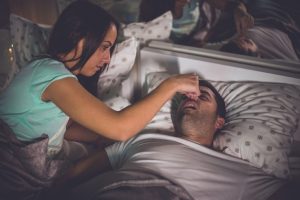Top 5 Myths About Snoring

Snoring is often a sign of obstructive sleep apnea (OSA), in which your airway gets closed off, or restricted, by something such as the back of your tongue or another piece of tissue. When you snore, you are getting some air past the obstruction, and the air flow causes the tissue to flap, which produces the sound. Not many people know the truth about snoring and its relationship to OSA.
Does Snoring Only Affect Overweight People?
It's true that excess weight is a leading contributor to snoring in many people. The excess weight on someone's neck and chin presses down on the throat when the person lies on their back, and that pressure can create an obstruction. There is a general misconception that if you are not overweight, then you won’t snore.
However, snoring can affect people of all sizes. All you need is for something to block your airway, such as when the tissue of your soft palate weighs down into your throat. Conditions like these are not weight-dependent.
Women Don't Snore
Unfortunately, mainstream media has influenced society into thinking that only men are susceptible to snoring. Snoring, airway obstruction, and OSA affect both men and women.
If You Wake Up Suddenly Gasping for Air, You Are a Snorer
It is true that many people with OSA, wake up during when they are sleeping, gasping for their breath, ultimately having an obstructive episode. It's also common for people to snore so loudly that they wake themselves up. However, many people do not wake up fully and do not remember anything about what happened while they were trying to sleep.
If you've been told you snore, or if you start to experience symptoms of OSA - such as daytime sleepiness, irritability, headaches, and dry throat upon waking up - don't dismiss them because you don't remember gasping for breath. You may just be able to fall back into a deep sleep very quickly after your snoring.
It's Just Allergies, You Don't Have to Worry.
What if you normally snore when it's allergy season? A lot of people believe that snoring due to allergies (or colds & other respiratory illnesses) is a harmless side effect that will go away when the allergy season ends.
It might be true for you that when allergy season ends, you'll stop snoring because you won't have congestion mucking up your airway. But in the meantime, you're still experiencing a reduction in air intake when you sleep.
OSA can lead to higher blood pressure and an increased risk of cardiovascular events and diabetes. Never assume it's just a little snoring due to allergies. If you find yourself still snoring, after you take allergy medication, you should consult a doctor.
If You Feel Fine, That Means You Don't Snore
One of the hallmarks of OSA and air-intake reduction due to snoring is daytime sleepiness. So does that mean that if you feel fine during the day, you don't snore? Maybe you're one of the lucky ones who doesn't feel tired, but that doesn't mean you don't snore at all. Some snoring can be very light, or it can be intermittent as you move around in your sleep.
There are a variety of treatment options available to help alleviate your snoring. While all of these options can be effective, oral appliance therapy provides a quick, comfortable, non-surgical solution that can help put an end to your snoring. At eos dental sleep, Dr. Levin is specially trained in oral appliance therapy and will provide you with a personalized consultation to determine if an oral appliance is right for you.
If you are suffering from snoring and are seeking a treatment solution, please contact eos dental sleep today.
